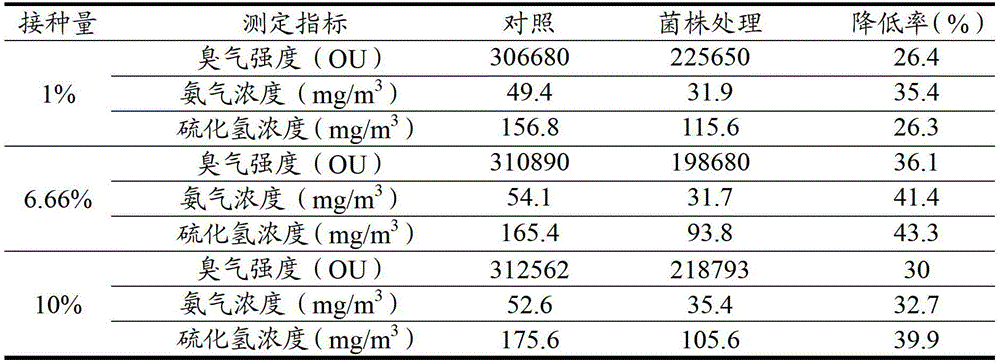Lactobacillus strain and application thereof
A technology of lactobacillus and strains, applied in the direction of bacteria, biological sludge treatment, microorganisms, etc., can solve the problems of complex microbial deodorant process methods, complicated deodorant methods, and poor deodorizing effect, and achieve deodorizing operation Simple and easy to operate, good on-site deodorization effect, stable deodorization effect
- Summary
- Abstract
- Description
- Claims
- Application Information
AI Technical Summary
Problems solved by technology
Method used
Image
Examples
Embodiment 1
[0017] The lactobacillus CGMCC6495 of the present invention is applied to feces deodorization.
[0018] 1. Preparation of culture medium and inoculation solution
[0019] Solid activation medium: peptone 10g, beef extract 10g, yeast extract 5g, glucose 5g, sodium acetate 5g, diammonium citrate 2g, Tween 801ml, magnesium sulfate 0.58g, manganese sulfate 0.05g, dipotassium hydrogen phosphate 2g, agar 15g~20g, add water to 1000ml, pH6.2. Sterilize at 121℃ for 30min.
[0020] Liquid expanded fermentation medium: peptone 5g, beef extract 5g, yeast extract 5g, glucose 10g, sodium acetate 5g, diammonium citrate 2g, Tween 801ml, magnesium sulfate 0.58g, manganese sulfate 0.05g, dipotassium hydrogen phosphate 2g, Make up water to 1000ml, pH6.0. Sterilize at 121°C for 30min.
[0021] Put Lactobacillus CGMCC6495 into the activation medium for activation and culture for 48 hours to obtain the activated strains for use; inoculate the activated strains into the expanded fermentation mediu...
Embodiment 2
[0028]Lactobacillus CGMCC6495 is applied to the deodorization of feces. It is the same as Example 1 and will not be repeated. The difference lies in the treatment conditions after the bacteria solution is inoculated into the feces.
[0029] After the bacteria liquid was inoculated into the feces, the beaker was sealed with plastic wrap, and the control treatment was carried out at the same time. The temperature was 20°C, and the odor intensity, ammonia gas concentration, and hydrogen sulfide concentration were measured after 5 days. The measurement results are shown in Table 2 below.
[0030] Table 2 Deodorization effect of Lactobacillus CGMCC6495 strain (20°C)
[0031]
[0032] It can be seen from the above table that when the temperature is 20°C, after 5 days of adding Lactobacillus CGMCC6495 bacterial solution to the feces, the odor intensity is reduced by 22.0%, the ammonia concentration is reduced by 28.9%, and the hydrogen sulfide concentration is reduced by 20.7%. C...
Embodiment 3
[0034] Lactobacillus CGMCC6495 is used in feces deodorization, and the same as Example 1 will not be repeated, the difference lies in the inoculation amount. The inoculum volume (V / W) was 1%, 6.66%, and 10%, respectively, and the measurement results at the end of the treatment are shown in Table 3.
[0035] Table 3 Deodorization effect of Lactobacillus CGMCC6495 strain (30℃±5℃)
[0036]
[0037] It can be seen from the above table that after adding different inoculum amounts of Lactobacillus CGMCC No.6495 to the feces for 5 days, the deodorizing effect showed a trend of first increasing and then decreasing with the increase of inoculum amount. The odor effect is the best, the odor intensity is reduced by 36.1%, the ammonia concentration is reduced by 41.4%, and the hydrogen sulfide concentration is reduced by 43.3%.
PUM
 Login to View More
Login to View More Abstract
Description
Claims
Application Information
 Login to View More
Login to View More - R&D
- Intellectual Property
- Life Sciences
- Materials
- Tech Scout
- Unparalleled Data Quality
- Higher Quality Content
- 60% Fewer Hallucinations
Browse by: Latest US Patents, China's latest patents, Technical Efficacy Thesaurus, Application Domain, Technology Topic, Popular Technical Reports.
© 2025 PatSnap. All rights reserved.Legal|Privacy policy|Modern Slavery Act Transparency Statement|Sitemap|About US| Contact US: help@patsnap.com



